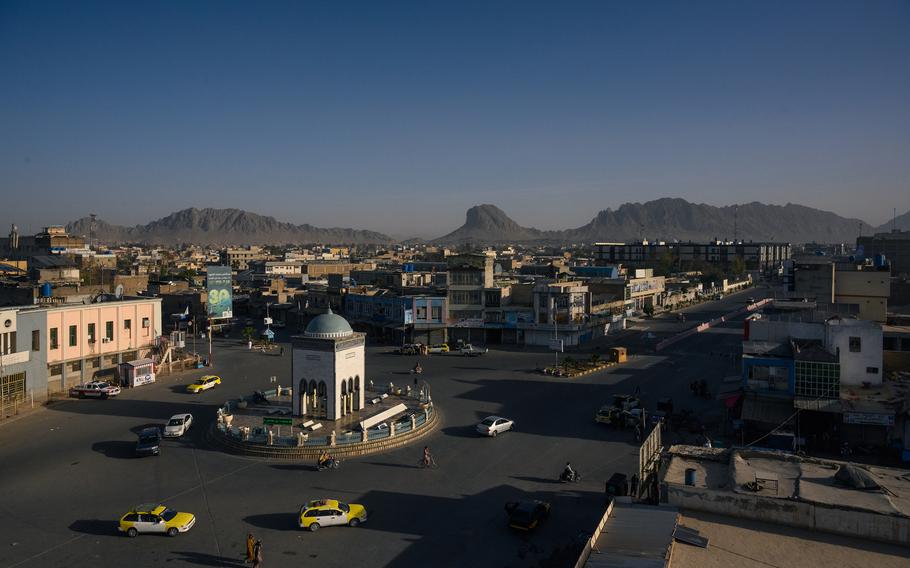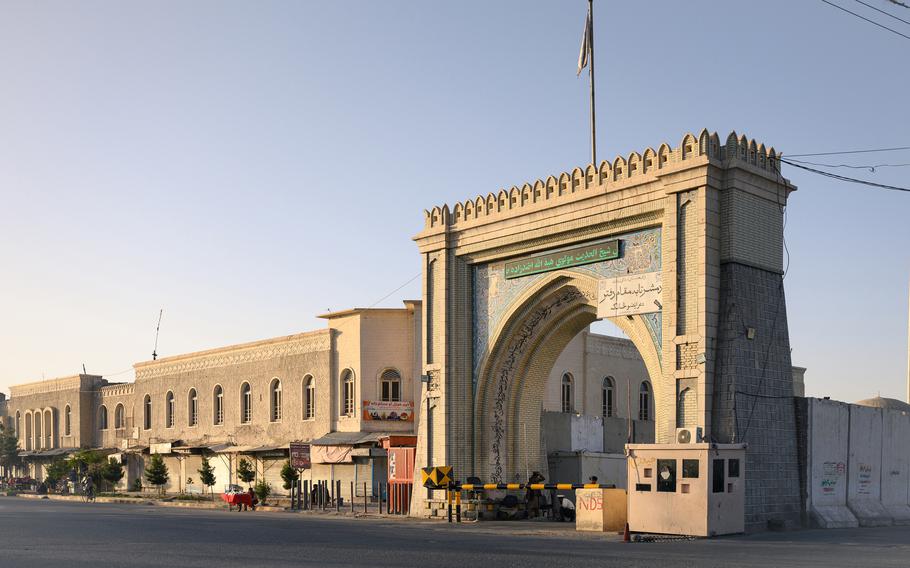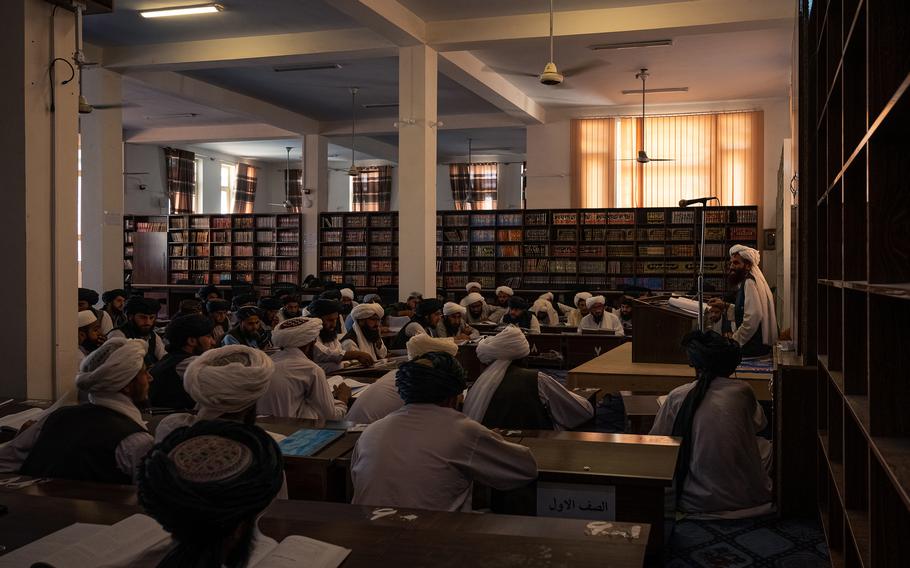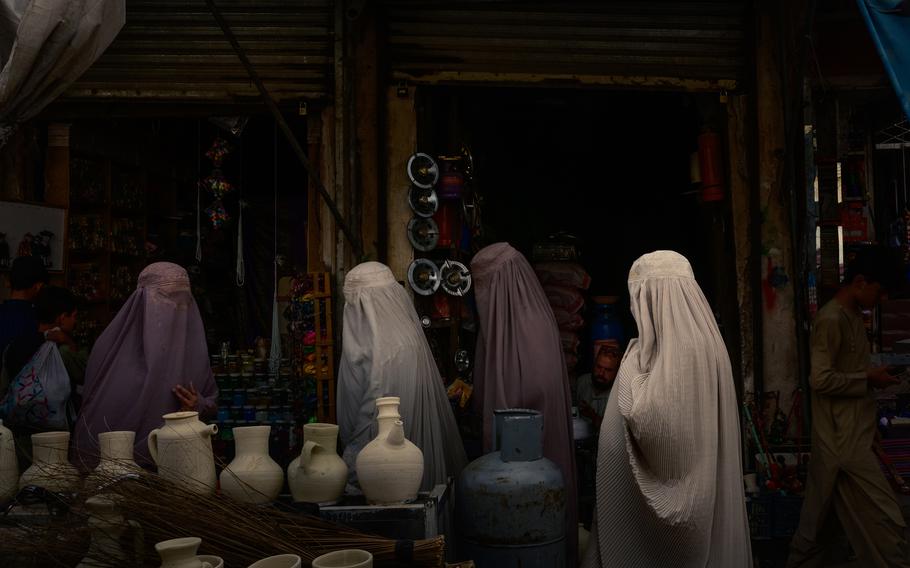
Kandahar, birthplace of the Taliban, begins coming to life early on a May morning. (Elise Blanchard/for The Washington Post)
KANDAHAR, Afghanistan — Before Sept. 11, 2001, this remote, sand-swept border city in southwestern Afghanistan was the seat of power of the Taliban, the militant Islamic regime headed by the reclusive Mohammad Omar. Camel caravans came and went; religious decrees were issued and obeyed. Kabul, the capital 300 miles to the north, was a ghost town of near-empty ministries and shuttered embassies.
Today, Kandahar is a bustling, secure and far more modern metropolis — on the surface. Factories produce aspirin and baby formula, taxes are collected and electricity is available around-the-clock.
In other ways, though, this ancient bastion of conservative tribal culture, the birthplace of the Taliban movement, has changed little since the group first ruled the country from 1996 to 2001. Kandahar has adjusted almost seamlessly to the 2021 return of the Taliban — and the revival of their rigid Islamist rule under another shadowy religious leader, Hibatullah Akhundzada.
Now there are indications that Taliban leaders under Akhundzada are making Kandahar their base from which to control the country, signaling the declining influence of more moderate Taliban members in the capital as the regime doubles down on repressive policies.
In the past month, regime officials have invited delegations from Japan and Qatar to meet them here, rather than with other officials in Kabul. The Taliban's chief spokesman, Zabihullah Mujahid, and a second information official from northern Afghanistan, Inamullah Samangani, were abruptly relocated here from offices in the capital.
There's been no official explanation for these changes. But they suggest Akhundzada is consolidating power by shifting the country's center of gravity to the Taliban's spiritual center — a move that could augur a hardening of the regime's opposition to international demands.

Taliban soldiers guard the entrance to government officials’ offices in Kandahar. (Elise Blanchard/for The Washington Post)
Mujahid and Samangani say their reassignments had no special significance. Samangani told The Washington Post his only interest was to obey the wishes of Akhundzada, who lives here. "Whatever he asks me to do, I will do gladly," Samangani said. "If he needs me to be here, I will be here."
Today, in the city of 614,000, women have largely vanished from markets and workplaces. Men have been lashed in the local sports stadium for adultery and theft.
While a few residents are willing to criticize these policies aloud, many have accepted them willingly as the price for restoring order and tradition after years of war, upheaval and Western influence.
"We have peace and security. That is what matters the most," said Jamshid Mateen, a man in his 40s who sells wedding gowns in a covered market. It's one of the few places in Kandahar where women may still shop freely.
Mateen's comments were echoed by many older men here. But younger males — including his teenage son — confessed that they miss listening to music, which the Taliban have again banned as un-Islamic. "It is frustrating," the boy said. "There is no fun anymore."
Akhundzada rarely leaves his high-walled compound, and is even more rarely seen in public. "He lives a simple life here in a rented house, not a luxury palace in Kabul," Mujahid told The Post. "He wants to have better relations with the nation and the international community."
Mujahid noted that most Taliban officials, including senior military and security ministers and Supreme Court justices, remain in Kabul, a cosmopolitan metropolis where 20 years of Western influence took deeper root. "The power is still there," he said.

A Taliban scholar teaches doctoral students at a madrassa in Kandahar. The regime is subsidizing hundreds of the religious schools for boys and men. (Elise Blanchard/for The Washington Post)
Still, official influence has been steadily moving here from the much larger capital. "The center of gravity is definitely shifting," said one analyst in Kabul, who spoke on the condition of anonymity for fear of retaliation. "When the main spokesman is there, it means the government is there. Kandahar is becoming the new capital."
In Kandahar, it is "much easier for the Taliban to control things than in Kabul," a much larger and more diverse city, said a former local business owner who now lives outside the country. He spoke on the condition that he be identified only by his first name, Mansour, for fear of retaliation. In Kabul, he noted, people are "more educated, more former officials are still there, and it is harder to enforce complete obedience."
A turning point in the shift came in March 2022. The regime, strapped for cash after resisting months of foreign pressure, promised to lift its ban on girls attending high school. But on the day they were due to return, the order was revoked, reportedly by Akhundzada. Teenage girls remain barred from studying.
In November, the Taliban resumed public lashing and stoning for criminals and moral offenders. They also allowed accusers to carry out public revenge punishments, including executions. All such punishments require final approval by Akhundzada himself.
In Kandahar, men expressed little concern about the resumption of Taliban rule, but some said older girls should be allowed to study. Most in the city are from the Taliban's Sunni religious sect and of Pashtun ethnic background; they also share its traditional tribal culture.
Business owners mingle easily with Taliban officials. Several complained about new taxes and the difficulty of importing foreign goods, but they said they otherwise had been treated well.
"Since the emirate came, there have been a lot of opportunities for business," said Sarwar Amani, director of the Kandahar bureau of industry and mines. "Owners are no longer worried about being kidnapped. Corruption has vanished and the previous practice of nepotism for contracts has stopped. Now anyone can invest."

Women last month at a Kandahar market. Women have largely vanished from markets and workplaces in the city of 614,000. (Elise Blanchard/for The Washington Post)
On a tract of suburban industrial land called Anomina, factories have begun operating again under exemptions from international financial sanctions on the Taliban. Snow Pharma, a large modern plant with Indian technicians and more than 1,000 Afghan workers, started turning out medicinal pills and capsules several weeks ago.
Local religious leaders are especially enthused about the return of the Taliban. The regime is subsidizing hundreds of madrassas — religious schools — for boys and men.
"Thanks to God, security is back and the government has given all rights to Muslims," said Mufti Ahmadullah Hemat, 35, a former Taliban fighter who teaches at a reopened madrassa. He spent three years as a prisoner at Bagram air base, the former main U.S. military base near Kabul, he said. "There are still many sacrifices because of foreign sanctions, but the emirate will not let the people suffer," he said.
Faculty members at the madrassas said girls should be allowed to study, but only under the "proper conditions," such as gender-segregated facilities. That's the position the Taliban has taken — without making it happen.
It's more difficult to discern the opinion of local women. Many have been sent home from jobs and some have stopped answering their phones. In public, they're scarce, hurried and fully veiled. Approached by a Post reporter, several shied away.
"Sometimes our old clients do call us and beg for help, but there is nothing we can do," said a foreign aid worker who once assisted women in Kandahar. "They are being separated from public life. Their very existence is withering away."
But several local professionals said the new restrictions reflect the region's traditional culture. Wives and daughters never participated in public life or social events where unrelated men were present. "It wasn't just the fault of men," one said. "If you took your wife out, all the other women would gossip."
The United Nations and national governments have condemned public corporal punishment. But some here say it's useful for deterring would-be criminals and more humane than long Western prison sentences.
"These methods are not harsh; they are soft," said Hafiz Mahmadulla, director of the madrassas. "Other countries put criminals in prison for life, but in Islam they are punished quickly and then it is finished."
There have now been scores of such spectacles nationwide, including several here in recent months. At one, an attendee said, Kandahar's soccer stadium was full and the crowd of men and boys was excited. Nine unidentified men who had been accused of theft, adultery or engaging in homosexual activity were lashed with up to 40 strokes each.
Mujahid, the government spokesman, said the Taliban want better relations with the international community, but "it cannot be on one side only."
"They will never support us," he said. "So why should we listen to their demands?"
Islam, he said, "has its own way" of dealing with criminal offenders. Public punishments, he said, "help citizens learn not to commit crimes" — and shame those who do.
"Islamic law is the most important thing," he said. "And it is what the people want."